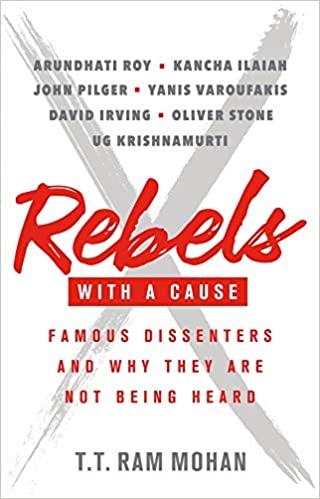Book: Rebels with a Cause: Famous Dissenters and Why They Are Not Being Heard
Author: T.T. Ram Mohan
Publisher: Penguin
Price: Rs 499
Romila Thapar attractively sums this as the age-old civilizational tension between the shraman and the brahman when she elucidates on early India’s battle in the realm of ideas: those who believed in the immortality of the soul and those who rebelled from this dominant view. Among the shramans were Charvakhas, Buddhists and Jains, who, apart from repudiating a more entrenched concrete mooring of spiritual belief, also rejected the hierarchy, rigidity and exclusion of caste. Expanded further, it could be argued that we have had a civilizational and ongoing battle on this soil, that of the shraman and brahman. In today’s parlance, it could well encompass those who questioned accepted structures of dominance and control and those who zealously rejected these. Then or now, what makes the role of the conscientious objector fascinating in general is also the skill, creativity and command that are brought to the task of questioning.
In the 21st-century world, for a book — a fairly detailed and comprehensive book — to be penned by a senior academic and management professional, and for the theme of the book to be contrary to the concerns of the world of management and business, itself merit special attention. T.T. Ram Mohan’s Rebels with a Cause does more than interrogate with empathy and detail the life and legacies of seven individuals, worldwide. The meticulously researched and balanced presentation of the dissenting voices make for informed reading even if the concluding paragraphs behind each voice somehow appear disappointing and perfunctory.
From the ancient Greeks to the Old Testament, Judaism, Christianity and Islam, the number, seven, has a special significance. Seven wonders, seven heavens, seven deadly sins, seven times walk around the sacred Kaaba at Mecca. Organized Hinduism also accords the number a special place as representative of divine concepts even as our music has seven musical notes. Mohan has chosen seven contemporary individuals to anchor this 2020 narrative around dissent. He calls them “famous” and also questions why they have not been heard or heeded enough.

Rebels with a Cause: Famous Dissenters and Why They Are Not Being Heard by T.T. Ram Mohan, Penguin, Rs 499 Amazon
The choice of the seven is eclectic. Three Indians make it to the list, two from the realm of social and political ideas and one from the omnipresent world of spirituality: Arundhati Roy, Kancha Ilaiah (Shepherd) and U.G. Krishnamurti, the last of whom the author characterizes in his preface as a “demolisher of the spirituality industry”. The other four are Oliver Stone, the American film-maker, David Irving, a British historian of World War II, Yanis Varoufakis, a Greek economist and the former finance minister of Greece, and John Pilger, an Australian journalist and also a maker of documentary films. Dominant narratives through history have often papered over nuances on dissent. It was the 20th-century historian equipped with the tools of Marxist analysis who prised open social, economic and political history-telling, paving the way for a completely unique approach to our view of the past. In the age of racing technology that has amplified (and even perverted) the written and the spoken word through newer and more unconventional modes of communication and the digital media, the reach and even the cult following of many such dissenters, too, have flourished. Is the reach of the ideas they threw up then far wider than what is quantifiable? While assessing their impact on political structures as modest, Mohan concludes that they have successfully applied a break on the dominant narrative. A questionable claim that the author makes, however, is that for the serious dissenter to be heard and effective, she or he better be rich and famous enough to afford it.
Significantly, three of the dissenters in this volume directly or indirectly question the present-day version of a rampant capitalism, referred crudely by some as crony capitalism. To quote the last and seventh dissenter in this volume, the 79-year-old journalist, John Pilger, who eloquently sums up how journalism has deteriorated since he began his career in the 1960s: “More than at any time before, it sees its role as one of supporting and protecting the establishment.” Pilger is forthright when he says the mainstream media can no longer be trusted. “Although journalism was always a loose extension of establishment power, something has changed in recent years. Dissent was tolerated when I joined a national newspaper in Britain in the 1960s has regressed to a metaphoric underground as liberal capitalism moves towards a form of corporate dictatorship. This is a seismic shift, with journalists policing the new ‘groupthink’, as [Robert] Parry called it, dispensing its myths and distractions, pursuing its enemies… Journalism students should study this to understand that the source of ‘fake news’ is not only trollism, or the likes of Fox news, or Donald Trump, but a journalism self-anointed with a false respectability: a liberal journalism that claims to challenge corrupt state power but, in reality, courts and protects it, and colludes with it.”
Pilger’s monumental works on Palestine, Australia’s indigenous people, whom the predominantly white State has so fundamentally wronged, South Africa, the US hypocrisy on the foreign front — most especially breeding its brand of Islamic extremists even as it unleashed military warfare and violence on Muslim societies in Afghanistan, Iraq and Iran — are what Indians need to be educated on as we face our own destiny at the end of 2020: Indian farmers taking on the power of the Indian corporatized State. That Varoufakis, Roy, and Ilaiah Shepherd, with their impressive voices and portfolios, also make it to the list of celebrated dissenters is significant and tells us something about the author. The inclusion of David Irving, controversial for his espousal of Hitler’s ignorance of the Holocaust, is telling given that the exclusion, impoverishment, marginalization and extermination of hundreds of thousands of Jews remain an example of the depth of mankind’s lows. The past 70 years have also seen the ‘victims’ turn into perpetrators if one looks dispassionately at the Isarel-Palestinian conflict. On U.G. Krishnamurthi, the anti-Guru, this reviewer prefers to remain silent. In this age where dissent is increasingly being penalized, the book is a definite must read.










